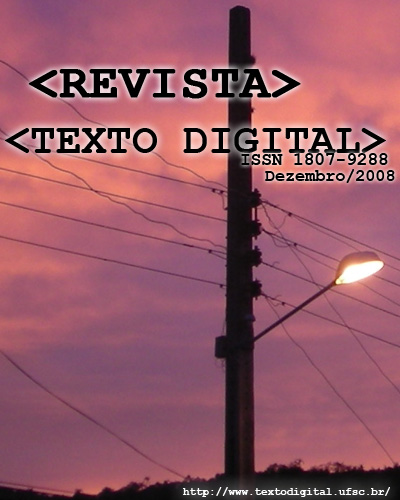 |
||||||||
|
|
|
To the reader. Going directly to the subject; not asking if digital texts and creations have a place in the world; looking at the different written matter and noticing that something must be analyzed; pulling up one's sleeves and accomplish this task. The seventh edition of Texto Digital presents itself with this goal. We are brought to joy by seeing that the texts linked here are committed to thinking and consequently elaborating a critique regarding digital writings, be these used as tools projecting themselves in the virtual space or as aesthetic proponents. Another reason for joy is that once more we may notice that the different areas of knowledge intertwine to reflect over the same subject. At one time the segregation of the different branches of knowledge, and their different forms of argumentation, were fundamental for the techno-scientific improvement of which we are the heirs, yet here is a good time and reason to recombine these different studies and scholars, being that a new field of (epistemological) investigation arises. Contributing to the consolidation of this different episteme, that tends to unite more than to separate, the writers of the essays found here propose a series of possible paths. Two of which mode their contributions based on, among other things, the notion of discourse genre (Marco Antônio Gutierrez speaks of emerging genres in the digital medium and Ana Cláudia Viegas proposes the concept of “autofiction”, regarding the question of autobiography and of how the internet can be used in this construction). Ivandilson Costa brings an analyses of the transformation occurred in the phenomena and strategies of publicity, being that it also makes use today of a computer's i(n)teractivity. Vanda Maria da Silva Elias and Rafaela Baracat Ribeiro launch themselves at blogs to analyze in this different written register the process of reference constituted by means of nominal expressions. A more theoretic reflection is held by Enrique V. Nuesch, who has dedicated himself to a careful and critical reading of two theoretic proposals for digital art. And finally, not closing but perhaps opening, or intermediating all these conversations, we have the honor of counting with the digital poem Rupture programmed by Tibor Papp, Hungarian poet who lives of/for poetry since the fifties and that has always been in the avant-garde of poetic manifestations broiling in Europe for the last fifty years. The poem in question has been made in the company of Claude Malliard. Soon we will also publish an interview (currently being finalized) with one of the main theorists of digital literature, Jean-Pierre Balpe. To the writings.
CREATIONS Rupture
INTERVIEW WITH JEAN-PIERRE BALPE
ESSAYS CHEATING AND CHEATS: SOME SUGGESTIONS FOR A RHETORIC OF GENRES OF DISCOURSE FROM PRINT TO WEB ADVERTISING: THE READER'S PATHWAYS IN THE ADVENT OF POST-HUMAN REFERENCE AND INTERACTIONS IN BLOGS
|
|---|


